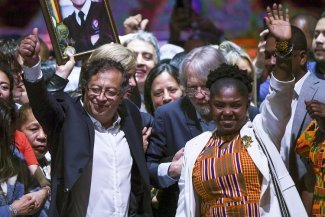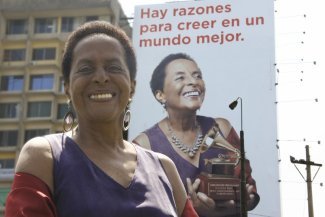Against the backdrop of the referendum for or against rewriting Chile’s constitution, in this photo taken in Santiago de Chile in September 2022,
a woman holds a banner saying: “Don’t be afraid of change”.
If we put aside the particular case of Portuguese-speaking Brazil after Lula da Silva’s hard-fought victory in last month’s presidential election, Spanish-speaking South America is experiencing a new wave of governments to the left of the political spectrum in Peru, Chile and Colombia.
They arrived, all of them, against a backdrop of growing social unrest, spilling over into street demonstrations. But they also came with the economic ghosts of the pandemic in tow, which partly explains their rise to power, as well as the constraints on their ability to implement their ambitious social proposals. These are not the lefts of the beginning of the century, propped up by the idea of ‘21st century socialism’ and the oil bonanza. They are post-pandemic and post-Bolivarian political projects, seeking to leave behind the Venezuelan model under the government of Nicolás Maduro.
What are the flags waved by these “new” leftists and what are the barriers to meeting their aims and consolidating this political option in the region once again? Although each country has its own particularities, some commonalities can be found between them.
A pragmatic Castillo
Pedro Castillo has been president of Peru since 28 July 2021, and ran as part of the left-wing Perú Libre party, from which he resigned in 2022. The country is in the throes of a political crisis in which it has had five presidents since 2016 – only two of them popularly elected – when a bitter struggle began between the executive branch and Congress. The legislature can remove the head of state at any time with 87 out of 130 votes, as María Sosa Mendoza, Peruvian journalist and researcher at the Peruvian Legal Defence Institute, explains.
“What Pedro Castillo has done is to make deals in Congress so that the 87 votes are not achieved,” explains Sosa Mendoza. She explains that the Peruvian president has been more pragmatic than ideological and that his administration has been based more on staying in power than on carrying out redistributive reforms, despite the social unrest. The frequent cabinet changes – more than 70 during his term in office – have prevented him from consolidating a political project, she adds.
The researcher points out that in this year’s opinion polls only 40 per cent of people who identify as leftists approved of Castillo, a percentage that was lower months ago, when it hovered around 25 per cent. Castillo is a “weak president” who, aside from failing to bring stability, is currently facing legal problems linked to corruption scandals.
Amid the country’s polarisation, the left “is faced with a dilemma, because Castillo is not implementing his campaign pledges”, is confronted with corruption cases and is appointing ill-equipped people to high-level posts in the government.
According to the researcher, any support Castillo receives from this camp is more practical than ideological, because in the context of political polarisation, “being against Castillo means giving support to an extreme right-wing opposition” that is struggling to mobilise the discontent with the president.
One of his main pledges, a constituent assembly, was rejected by Congress in May 2022 and has little chance of succeeding in the future. Land reform, another of his proposals, “has lost its original form” and has been distorted by ministerial changes.
The Peruvian case is perhaps the most atypical and distinctive of the three. The domestic situation has led to Castillo being a rather isolated president. Gustavo Petro, president of Colombia, and Gabriel Boric, his counterpart in Chile, by contrast, have a close relationship and an ambition to cement a regional bloc with a view to positioning some of their political aims.
A weakened Boric
Boric took office on 11 March 2022, half a year before the referendum to approve or reject a new constitution in place of that inherited from the Pinochet dictatorship. For Chilean political scientist Javiera Arce Riffo, Boric’s government assumed that it would begin implementing its reforms once the new constitution was approved, that this would be its navigation map. They did not anticipate an unfavourable outcome. This happened, in part, according to Arce Riffo, because of the government’s weakness in its first few months. It was the voters’ way of punishing it, in a sense, for its poor performance.
In light of this and the global inflation crisis “it is questionable whether Gabriel Boric will be able to deliver, and that applies to most of his manifesto, because he doesn’t have the majorities he needs in Congress, so he will have to opt for one or two reforms and that’s it,” predicts Arce Riffo. The most likely outcome will be a failure to deliver on a manifesto that already had to be watered down during the election campaign because of its ambitiousness. He will not be able to forgive student loans, for example, nor will he be able to increase social spending, as he is currently working on a tax reform that is only likely to raise enough to finance the state’s current expenditures.
Arce Riffo believes that, with Boric’s political capital and the financial situation he faces, he could make a bid for two complex reforms: to the pension system and health care.
But what can be achieved in areas such as universal access to health care, as the political scientist points out, will be more timid than what the failed constitution sought to enshrine.
Valeria Coronel, historian, teacher and researcher at FLACSO Ecuador (Latin American Faculty of Social Sciences), believes that unlike the complex constitution that was drafted, the Boric administration’s plan is simpler: “It is a plan that seeks to put an end to the total economic deregulation and to start rebuilding certain social rights that will enable the regulation of a community that is on the verge of being dispossessed as a result of 40 years of neoliberalism.”
For Javiera Arce Riffo, the reason for the left’s rise to power is the rejection of the predecessors to the current governments. In Chile and Colombia, the former presidents, Sebastián Piñera and Iván Duque, ended up with high voter disapproval ratings. She does not, however, dismiss the fact that, hard hit by the social impact of the pandemic, the public was very receptive to ideas such as the promise of a good life (‘vivir sabroso’) made by Colombia’s vice president, Francia Márquez. Pledges to reverse the social impact of the pandemic resonated with voters at a favourable political moment.
But, “if there is no concrete solution to such basic issues as security and public order, the promise of a good life will amount to nothing,” says Arce Riffo. “If you don’t bring rising inflation under control, even if you promise people a great pension or health system, they are not going to care,” she adds. And this applies to both Chile and Colombia.
Both governments share the same ‘performative’ trait: they make announcements that they describe as historic but they have not yet had any impact on people’s day-to-day lives, which, according to the Chilean political scientist, could also lead to their demise.
An environmentalist Petro
Gustavo Petro’s government is the newest of the three. He has been head of state in Colombia for little more than two months and it is the first time a political project that calls itself progressive has risen to the highest level of executive power in Colombia.
Petro took office on 7 August 2022 and in the weeks since then has tried to push forward several ambitious agendas: a progressive tax reform that has met with reticence from the private sector; steps towards land redistribution through agreements with a sector historically hostile to this policy, such as the livestock sector; and the opening of negotiation and ‘submission’ processes with all types of illegal armed groups, with a view to achieving what he has grandiloquently called “total peace”.
For Valeria Coronel, these political projects need to be read in terms of their relationship with the elites.
While in Chile these are elites with long-standing business expertise and state backing, in Colombia they have been formed in the regions, “not to build a Colombian nation, but to guarantee their power through an oligarchic pact” that has excluded the country’s lower classes since the 19th century and is still in place today. For the academic, however, this oligarchic order is not being replaced but challenged by historically excluded groups.
As part of this inclusion process, Petro is promoting a change in the narrative on drugs and more differentiated responsibilities with regard to climate change. He is asking the world to swap foreign debt for environmental services and is pushing for an energy transition that has the business community’s hair standing on end, having suggested an end to new oil, gas and coal exploration, with all that this might represent in fiscal terms.
The stories of Peru, Chile and Colombia are different, for example, in terms of the role of ethnicity in shaping their nations and the rise of these governments, but Coronel believes that in all three cases these projects “offer a combination of democratisation, the inclusion of people-centred agendas within the democratic project, and the regulation of capital rather than the policy of open concessions over territories”. This regulation, she clarifies, is not “post-capitalist”, it does not go beyond capitalism, but seeks to contain it for the benefit of certain population groups, which are different in each country.
This applies both to Colombia, a country where all the governments of contemporary times have been liberal or conservative, and to Chile, where the left has been in power, in the form of the now dissolved Concertación coalition. These countries also have agendas that are clearer than that of Peru when it comes to gender and the environment. Boric was promoted, among others, by feminist movements, and gender equality is one of his banners. In Petro’s case, his vice president, Francia Márquez, represents both this struggle and those of Afro-Colombians.
Identity issues and the critique of the extractivist and oil-dependent model are a feature of these leftist parties that was not present on the traditional Marxist left.
Meanwhile, Pedro Castillo, despite his teacher and trade union origins, has profoundly conservative traits when it comes to gender. “He has conservative values, but it is not something that defines his political identity, because he is capable of negotiating,” says María Sosa Mendoza. The green and multicoloured flags waved by the Chilean and Colombian governments seem to be more absent in the Peruvian case.
It is too early for a full assessment of Boric, Petro or Castillo. Although they bring something new to the region, compared to previous projects and figures that have already governed and whose styles and scope are clearer, such as the recently elected Lula Da Silva in Brazil, their newness, their promises and performances are up against a complex economic reality that looks set to become even harsher, and that will undoubtedly force them to at least moderate their expectations and operate more within the realm of the possible.













